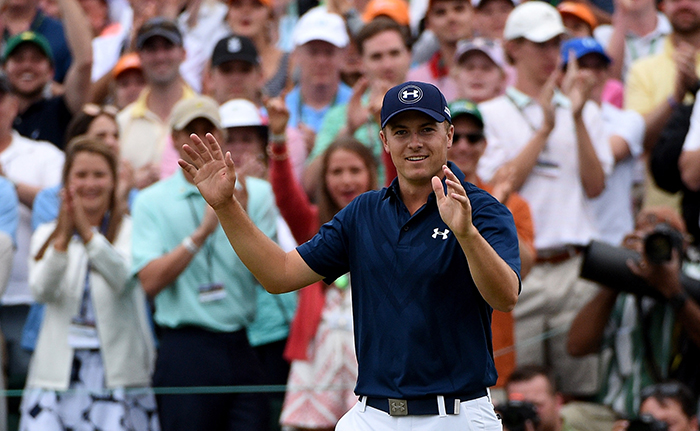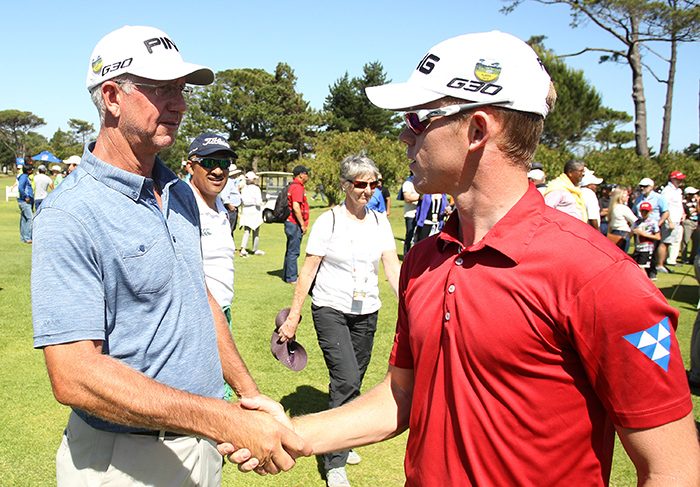Put passion aside, the next generation of pro golfers are going to come from over-eager parents, writes Mike Taylor.
A recent trip to the driving range had me tee up next to a boy, roughly 12 years old, who was hitting mediocre shots. The boys his age generally have a good swing and can be seen nailing their irons with the pomp of youth, driven by the need to impress.
This fellow explained that his father’s love of golf brought him to the range so often, it wasn’t even close to being his favourite sport. That was rugby.
A week later I was chatting Brandon Stone, a pro who was born in 1993 and earned more than R13-million this year. I joked that in 2015 he was practically living at home and 12 months later he was getting recognised at the grocery store, but I was quickly corrected – he’d bought a first house at age 22.
(He’s pictured here being congratulated by his father Kevin, who is also a professional, after winning the 2015 Cape Town Open)
We then spoke about the changes that come with international success. Time, he explained, was the one thing he didn’t appreciate until now. The festive break meant, in his words: ‘spending time with my girlfriend, seeing my dog, living at home and working on my house a little bit.’
How many 23 year olds talk like that?
Stone later detailed his admiration for all that Rory McIlroy and Jordan Spieth have achieved, both of them child prodigies who became major champions.
The modern pioneers in this sport are 20-somethings who’ve provided clear guidelines to making it big. First and foremost you need to play the game from a young age.
Sunshine Tour rules official Lance Michler, who oversees a bunch of juniors at Modderfontein Golf Club in Johannesburg, reckons that kids need to start from six or eight years old in order to get a fair chance at a successful pro career. That’s the age Ernie Els started playing, Retief Goosen even younger.
Parents are the driving force, because no eight year old is ready to make those kinds of choices about his future. Nowadays the internet is full of video examples to follow, like Rory McIlroy at age three.
Coaches are aware of this age phenomenon as well. Cameron McCormick, who taught Jordan Spieth from 12 years old, had this to say of the Texan superstar.
‘Based on previous benchmarks, those of Tiger Woods, Phil Mickelson, the great juniors that have gone before him. If they’re any sign then I think he can match up there with the greatest,’ he said in 2008, when Spieth was 14.
It’s a conundrum in the world of golf, this need to start playing the sport before puberty.
Golfers like Stone, Spieth and McIlroy are mature for their age and comfortable as global sports icons, but their entire lives have been dedicated to the sport.
Formula one champion Nico Rosberg, who retired five days after winning the drivers’ championship, explained that he was finally done after 25 years of commitment.
‘Through the hard work, the pain, the sacrifices, this has been my target. And now I’ve made it,’ said the Fin, who started racing at age six. ’I have climbed my mountain, I am on the peak, so this feels right.’
Golf offers more longevity than motor racing, but I fear that the best of this generation could sour to the game, especially once they’ve ticked off career goals like winning the majors. Take a look at what happened with Olympic participation, no Spieth or McIlroy there.
It’s hard to predict what this new generation will feel when they hit 35 (which is golfing prime) but we could be in for some early retirement and that would be a pretty sad thing. Then again, it opens the door for a new wave to succeed. As they say, good enough is old enough.









